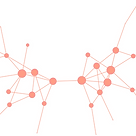


Project
Conceptual framework
The project assumes that the process of knowledge creation about politics in closed settings can be roughly divided into three stages - and that networks shape that process within and between the stages. Click on the links for more information on each stage and the research activities associated with them.
In the first stage, positive and negative relationships between the relevant political actors in a closed setting influence the political outcomes, but also what kind of information is released to the outside and how this information is framed.
In the second stage, experts of that closed setting provide an interpretation of the information that they receive publicly or privately through leaks and their insider sources. The individual experts' interpretation may be influenced by those of their peers.
In the third stage, experts' connections to the public, i.e. to governments or the media, influence whether their interpretation shapes the public narrative regarding the closed setting.
At the same time, political actors may exert pressure on the experts or try to shape the public narrative themselves.


Networks Behind Closed Doors
This work package contains two research activities: developing an approach to automate the extraction of network information from unstructured text via large language models (LLMs) and other AI-tools to better understand the relationships between the political actors in the relevant governments, and an analysis of the sources used by experts when analyzing politics in closed settings.
Using LLMs to extract political networks
With the help of the University of Bern's Data Science Lab and a grant by the University of Bern's Digitalization Commission, we have explored the use of open-source LLMs and compared their performance to that of GPT's different models.
We're currently organizing a workshop for scholars working on the same problem - if this is you, please get in touch with us!
Source Analysis
In progress

The relationship among members of President Trump's inner circle according to GPT o4-mini's reading of Forbes' trumpiverse website.

Networks To and Among Experts
In this work package, we first establish a list of China and of Russia experts using a snowballing nomination process. In a second stage, we will establish a panel of country experts that we survey on a regular basis to understand how interaction with other experts influences their assessment of the political situation in China and Russia, respectively.
For the China expert survey, we are collaborating with Jos Dornschneider-Elkink (University College Dublin) and Hans Hanpu Tung (National Taiwan University). You can find more information on the dedicated project website and in our "China Watchers" article in PS: Political Science & Politics.
For the Russia experts survey, we are collaborating with Michael Rochlitz and Arthur McFarlane (Oxford University).


Networks To the Audience
In this work package, we analyze expert appearances in the media and their activities on social media.

